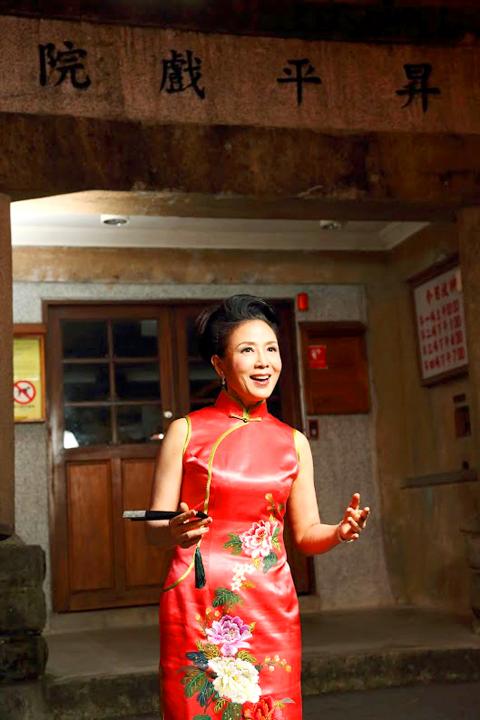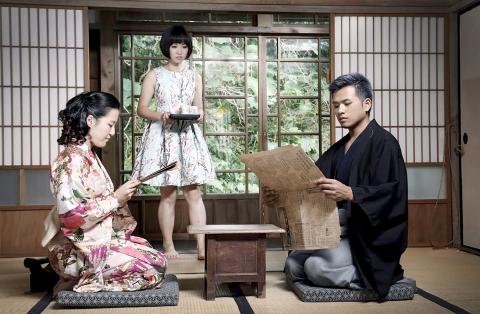Liu Ruo-yu (劉若瑀) has been best known in recent years for her work with the Zen-based drumming troupe U-Theatre (優人神鼓) that she founded in 1988 and the rather ascetic lifestyle it entails.
The company is renowned for its drumming, martial arts training system and its very long yunjiao (雲腳, “cloud feet”) walks — around Taiwan and in several other nations. It just held a three-day walk for young drummers early last month in Taitung County.
So pictures of Liu dressed in a bright red, flower-bedecked cheongsam, hair in a bun, might come as a shock to those who are used to seeing her in more simple cotton and linen outfits.

Photo Courtesy of U-Theatre
However, those who remember Liu from her days as one of Taiwan’s most prominent stage actresses with the Lan Ling Theatre — she won a Golden Bell in the early 1980s — are less surprised by the glamour shots for the company’s new show, Town of Gold (淘金去), which opens in New Taipei City’s Jiufen District (九份) on Friday next week.
Liu quit the stage to go to the US to study for a masters’ degree in theater arts at New York University. After graduation, she was selected to join a one-year-workshop in California led by famed avant-garde Polish director Jerzy Grotowski.
It was Grotowski’s challenge her to explore herself and her heritage that led her found U-Theatre upon her return home, and focus on more traditional Taiwanese folk rituals and music. She wanted to create theater works that would enable both the performers and their audiences to transcend conventional visions.

Photo Courtesy of U-Theatre
The company’s latest production, which is a big departure for U-Theatre, promises to do just that. It is a musical and its 21-member cast includes several actors, actresses and singers, in addition to Liu herself.
Liu and U-Theater were invited to create a show by the New Taipei City Cultural Affairs Bureau, which wanted to give visitors a better understanding of Jiufen’s history.
Company members spent about a year interviewing elderly residents of Jiufen and surrounding area, looking for stories about the town’s history, its culture and the changes it has seen, as well as collecting folk songs and once-popular tunes.
The show focuses on changes to the town during the Japanese era and after World War II and is largely told through the eyes of the women in the story.
While Liu’s skills as an actress focused more on straight theater, she said singing is something she enjoyed as a child, and she grew up listening to her father singing.
Town of Gold will be performed in Jiufen’s Shengping Theater (昇平戲院), which was built in 1914 during the Japanese colonial era. It was Taiwan’s first — and for the time, biggest — modern theater.
The Baroque-style building was renovated in 1961, but closed in 1986 amid the decline of the town’s mining industry.
The theater, like much of Jiufen, was highlighted in Hou Hsiao-hsien’s (侯孝賢) 1989 award-winning film A City of Sadness, which triggered a revival of interest in the town, and the theater became a popular backdrop for several commercials and other productions.
The theater was renovated and reopened as a cinema in September 2011. Now it will serve as the backdrop for a new telling of Jiufen’s story.
Jiufen is a bit off the beaten track for a theater production, but the town can be reached by bus No. 1062 from the Taipei Zhongxiao Fuxing MRT stop, or by a combination train/bus trip to the train station in Rueifang District (瑞芳) and then changing to bus numbers 788, 827 or 825.
Performance Notes
WHAT: Town of Gold
WHEN: Dec. 25 to Dec. 27, Dec. 30, Jan. 1 to Jan. 3, Jan. 6, Jan. 8 to Jan. 10, evenings at 7pm and matinees at 2pm
WHERE: Jiufen Shengping Theater (九份昇平戲院), at the intersection of Hsuchi Road and Chingbian Road, Jiufen, New Taipei City (新北市九份豎崎路與輕便路交接處)
ADMISSION: NT$800 and NT$2,000; available online at www.accupass.com/go/utheatre (phone: 02-8978-1001) or through U-Theatre at 02-2938-8188

This month the government ordered a one-year block of Xiaohongshu (小紅書) or Rednote, a Chinese social media platform with more than 3 million users in Taiwan. The government pointed to widespread fraud activity on the platform, along with cybersecurity failures. Officials said that they had reached out to the company and asked it to change. However, they received no response. The pro-China parties, the Chinese Nationalist Party (KMT) and Taiwan People’s Party (TPP), immediately swung into action, denouncing the ban as an attack on free speech. This “free speech” claim was then echoed by the People’s Republic of China (PRC),

Exceptions to the rule are sometimes revealing. For a brief few years, there was an emerging ideological split between the Democratic Progressive Party (DPP) and Chinese Nationalist Party (KMT) that appeared to be pushing the DPP in a direction that would be considered more liberal, and the KMT more conservative. In the previous column, “The KMT-DPP’s bureaucrat-led developmental state” (Dec. 11, page 12), we examined how Taiwan’s democratic system developed, and how both the two main parties largely accepted a similar consensus on how Taiwan should be run domestically and did not split along the left-right lines more familiar in

Specialty sandwiches loaded with the contents of an entire charcuterie board, overflowing with sauces, creams and all manner of creative add-ons, is perhaps one of the biggest global food trends of this year. From London to New York, lines form down the block for mortadella, burrata, pistachio and more stuffed between slices of fresh sourdough, rye or focaccia. To try the trend in Taipei, Munchies Mafia is for sure the spot — could this be the best sandwich in town? Carlos from Spain and Sergio from Mexico opened this spot just seven months ago. The two met working in the

Many people in Taiwan first learned about universal basic income (UBI) — the idea that the government should provide regular, no-strings-attached payments to each citizen — in 2019. While seeking the Democratic nomination for the 2020 US presidential election, Andrew Yang, a politician of Taiwanese descent, said that, if elected, he’d institute a UBI of US$1,000 per month to “get the economic boot off of people’s throats, allowing them to lift their heads up, breathe, and get excited for the future.” His campaign petered out, but the concept of UBI hasn’t gone away. Throughout the industrialized world, there are fears that